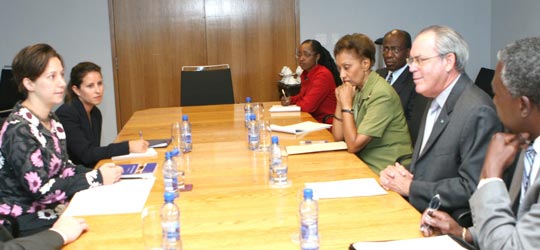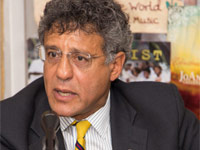
NASSAU, The Bahamas — The Bahamas Government condemns all forms of human trafficking and is making preparations to create public awareness on such issues, the Ministry of Foreign Affairs has confirmed.
On Thursday, September 2, 2010, the Hon Brent Symonette, Deputy Prime Minister and Minister of Foreign Affairs and Immigration met with Amy Rofman, Officer of the United States Department Office to Monitor and Combat Trafficking of Persons, to discuss the 2010 Trafficking in Persons (TIP) Report on The Bahamas.
Under the 2000 Trafficking Victims Protection Act (TVPA), the United States Secretary of State is required to submit to Congress, an annual report referred to as the Trafficking in Persons (TIP) Report. The main objective of the Report is to stimulate action and to create partnerships around the world in the fight against modern day slavery.
Since the 2009 TIP Report, countries established as a country of origin, transit or destination for victims of severe forms of trafficking are included in the Report and are assigned to three tiers.
The Bahamas is classified as a Tier 2 country; the Report alleges that The Bahamas is a destination for Caribbean nationals, particularly of Haitian and Jamaican nationality, who are subject to forced labour and forced prostitution by trafficking perpetrators.
Haitian trafficking victims have been noted, as targets for forced labour in agriculture, domestic service or forced prostitution, while Jamaican and other foreign women are reportedly subject to forced prostitution. Based on the contents of the Report, luring mechanisms such as offers of employment serve as a means to facilitate acts of human trafficking, particularly in the latter case.
“Despite the accusations, The Bahamas condemns all forms of human trafficking and maintains that by virtue of Article 3 of the Protocol to Prevent, Suppress and Punish Trafficking in Persons, Especially Women and Children, incidences of employer coercion cannot by itself be termed as an office of human trafficking, nor is it evidence that persons are being trafficked,” the Ministry said.
It added, “The Bahamas, while noting the recommendation that it ought to take steps to identify possible trafficking victims among migrants attempting to enter The Bahamas illegally, queries this recommendation within the context of illegal migration, which does not provide law enforcement with advance notice.
“Additionally, The Bahamas queries the critique that the Government made minimal efforts to prosecute trafficking offenders considering that under Protocol, human trafficking offenses are victim driven and that successful prosecutions in human trafficking cases require the positive participation of such victims.”
Given the context of the provisions of Bahamian legislation, which is acknowledged in the Report as affording immunity to and protection of trafficking victims, the Ministry said it should be noted that if victims of trafficking were to be identified, the issue is always whether or not they will be prepared to provide the evidence necessary to sustain a prosecution.
“The Ministry of Social Development is already making preparation to create public awareness on the issue of human trafficking,” the Ministry of Foreign Affairs said.
Bahamas Information Services


